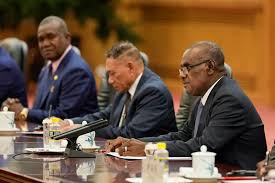BEIJING, July 12:The Solomon Islands’ new prime minister is in Beijing for a visit as China and the strategic Pacific archipelago strengthen their ties.
Prime Minister Jeremiah Manele met his Chinese counterpart Li Qiang on Thursday and was holding more meetings Friday before his departure Monday.
China’s influence increased significantly during the term of Manele’s predecessor, with the country switching diplomatic recognition from Taiwan to China and striking a secret security pact that has raised fears of China’s security forces gaining a foothold in the region long dominated by the US, Australia and New Zealand.
Those moves came at a time of major tensions between Washington and Beijing, and the Solomons’ tighter ties with China are seen as undermining the influence of the US and other traditional allies in the Western Pacific.
During their meeting, Li pushed for closer economic cooperation and a “strategic partnership” between China, the Solomons and other Pacific island nations, according to China’s official Xinhua News Agency.
Li “stressed that China will continue to uphold the principles of mutual respect, equality, mutually beneficial cooperation and common development,” Xinhua quoted Li as saying.
No explicit mention of military or police ties was published, but the security pact has raised major concerns of a Chinese naval presence in the region and the basing of ground troops that could challenge other countries access to the region that lies close to Australia and over which Japan and the US fought savage battles during World War II.
While the Solomon’s turn toward China has not been universally welcomed by the country’s politicians, the May election of Manele and his Beijing visit, suggests the country will continue in that direction.
Manele earlier visited Australia and is also expected to travel to Japan in a bid for investment and development assistance for the country of 726,799 people with a GDP of less than USD 2 billion that is heavily dependent on fishing, agriculture, forestry and mining. (AP)


